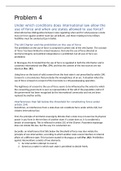Samenvatting
Summary Uitgebreide uitwerking probleem 4 Introduction to International and European Law
Hierin vind je de uitgebreide uitwerkingen van de leerdoelen van probleem 4 van Introduction to International and European Law. Gebruikte boeken: - A. Henriksen, International Law (third edition) - Cases and Materials International and European Union Law
[Meer zien]




